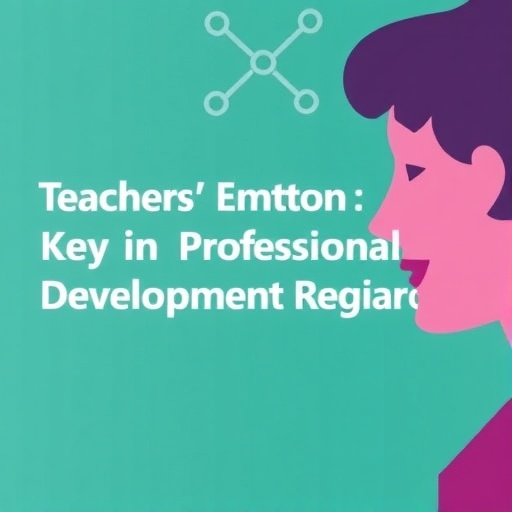Education professionals continuously strive to enhance their effectiveness in the classroom, a goal that significantly hinges on their emotional well-being and professional development. In a systematic review presented by Ehlert, Grunschel, and Koehler in the esteemed journal Educational Psychology Review, the intricate relationship between teachers’ emotions and their assessment within professional development contexts has been meticulously explored. This comprehensive examination highlights the vital role emotional factors play in shaping teaching practices, thereby influencing student outcomes.
Teachers are often positioned at the frontline of educational reform and innovation, facing immense pressures that can evoke a complex array of emotions. These feelings, ranging from enthusiasm and passion for teaching to frustration and anxiety, can directly impact how they approach professional development. The study chronicles these emotional influences, revealing how teachers’ perceptions affect their engagement with ongoing training and support. Emotional responses can either serve as a catalyst for growth or a barrier that inhibits progress.
One of the central findings from the review indicates that positive emotional experiences are linked to higher levels of job satisfaction and commitment among teachers. This emotional commitment is not merely an abstract notion but has tangible outcomes, correlating with increased student engagement and success. Conversely, negative emotional experiences can lead to burnout and disengagement, drastically affecting the educational ecosystem. This emotional dichotomy underpins the necessity for more emotionally responsive professional development programs that recognize the individuality of teachers’ emotional experiences.
A further exploration into how teachers assess professional development opportunities reveals that their emotional states significantly influence their evaluations. Teachers who are in a positive emotional state tend to view professional development initiatives as valuable and relevant, while those who are experiencing negative emotions often regard the same opportunities with skepticism. The nuanced assessment reveals a critical need for program designers to incorporate emotional intelligence elements into training modules, which could potentially facilitate a more conducive learning environment for educators.
The review also suggests that the emotional experiences of teachers should not be isolated from their pedagogical practices. It underlines the interconnectedness of emotions, teaching methodologies, and student interactions. Emotional awareness is an essential skill that can transform the teaching process. By acknowledging their emotions, teachers can create supportive classroom environments that enhance learning for their students. The reflection on emotional practices might lead to more empathetic approaches that resonate with students, consequently creating a positive feedback loop that benefits both teachers and learners.
Moreover, the systematic analysis points out that while substantial research has been devoted to students’ emotional experiences within educational settings, teachers’ emotions have remained relatively underexplored. This imbalance calls for increased scholarly attention towards understanding the emotional landscape of educators, especially those in high-pressure teaching environments. The implications of such research can extend beyond individual classrooms and influence broader educational policies aimed at fostering a supportive workforce.
The authors advocate for a paradigm shift where teachers are considered not only as practitioners of educational content but as emotional beings whose experiences should be an integral part of professional conversations. The emotional well-being of teachers should be prioritized, with institutions creating structures that support emotional engagement and resilience. This can contribute to a healthier educational climate, where teachers are empowered to thrive rather than merely survive.
Furthermore, Ehlert, Grunschel, and Koehler emphasize the necessity of integrating emotional skill-building into teacher training programs. Programs that equip future educators with tools to manage emotions effectively will likely yield higher educational outcomes. Such training should be holistic, addressing emotions during curriculum planning, classroom management, and interpersonal interactions with students and colleagues alike.
It is equally important to recognize the role of educational leaders in fostering an environment that values emotional well-being. Leadership needs to enact strategies that promote emotional awareness within schools, encouraging teachers to share experiences and develop supportive networks. These networks can serve as vital support systems that mitigate stress and promote a culture of collaboration.
Through engaging in discussions about emotional health, leaders can directly influence the professional development landscape, steering it towards more emotionally attuned practices. The research indicates that when teachers feel heard, valued, and supported emotionally, they are more inclined to embrace professional growth and innovate in their teaching strategies.
The insights gathered from Ehlert et al.’s review present a compelling case for a dual focus on emotional development and pedagogical efficacy. This holistic approach not only benefits teachers but can dramatically enhance student experiences and learning outcomes. Future research should continue to explore the ways in which educators’ emotional states shape educational practices, ensuring that emotional intelligence is embedded within teacher training and continuing professional development.
As the discourse around educational methodologies evolves, the role of emotions in teaching can no longer be regarded as peripheral. Instead, it must emerge as a cornerstone around which innovative professional development initiatives are constructed. Embracing this notion can lead to a reinvigorated educational landscape, one that prioritizes the emotional health of teachers and, by extension, the academic success of students.
In conclusion, this comprehensive review sheds light on the undercurrents of emotional dynamics in the teaching profession, reiterating the necessity for a robust framework that supports teachers at an emotional level. By doing so, we pave the way for educators who are not only knowledgeable and skilled but also emotionally equipped to face the challenges of an ever-evolving educational world.
Subject of Research: The role of teachers’ emotions and their assessment in professional development research.
Article Title: The Role of Teachers’ Emotions and Their Assessment in Professional Development Research: A Systematic Review.
Article References:
Ehlert, M., Grunschel, C. & Koehler, F. The Role of Teachers’ Emotions and Their Assessment in Professional Development Research: A Systematic Review.
Educ Psychol Rev 37, 69 (2025). https://doi.org/10.1007/s10648-025-10048-w
Image Credits: AI Generated
DOI: 10.1007/s10648-025-10048-w
Keywords: Teachers’ emotions, professional development, emotional intelligence, educational psychology.




